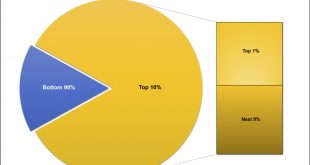Why do we think the world is about to see the resurrection of the “comrade culture club” over the next ten years? Make no mistake; there will be a visceral political reaction to the coming acceleration of labor disrupting technology. We got a little taste of it in the 2016 election. Just wait until it hits the doctoring, lawyering, and accounting class.... Technology replaced the farmers. Now it is coming for the industrial workers and many types of service workers, too. Soldiers and...
Read More »David F. Ruccio — What, us worry?
Occasional Links & CommentaryWhat, us worry? David F. Ruccio | Professor of Economics, University of Notre Dame
Read More »erablogdotcom — Bank income and spending
One of the most common difficulties many people encounter in understanding the mechanics of the financial system lies in their failure to understand the difference between stocks and flows. erablogdotcom Bank income and spending
Read More »Bill Mitchell — There is no European citizen – cultures and narratives diverge in the Eurozone
I have noted before that when someone asks me where I come from I immediately (and innately) respond Australia. If questioned further I might tell them I grew up in Melbourne, Victoria. Sure enough, I am a Victorian (with some of the cultural attachments that that denotes) but that affiliation is weak compared to my nationality. That doesn’t make me a xenophobe or a nationalist. It just says I am culturally from that geographic area. If I ask my friends from Italy, Spain, France, the UK,...
Read More »Richard Sakwa: The Key Challenge for Russia is to Avoid Inflicting Damage on Itself – Rethinking Russia
Rethinking Russia sat down with University of Kent’s Professor Richard Sakwa to discuss his new book Russia Against The Rest, its relations with the West, its role in a new world order as well as its greatest challenges in 2018. Richard Sakwa is on the level of Stephen F. Cohen and Paul Robinson as a Russian analyst — worth saying attention to.Rethinking RussiaRichard Sakwa: The Key Challenge for Russia is to Avoid Inflicting Damage on Itself – Rethinking Russia Interviewed by Pavel...
Read More »Glenn Greenwald — A Consensus Emerges: Russia Committed an “Act of War” on Par With Pearl Harbor and 9/11. Should the U.S. Response be Similar?
Whether intentional or not, this is preparing the American public for an overt conflict of US and Russian forces in Syria and a hot proxy war in Ukraine this spring. This is now entering the high danger stage. The InterceptA Consensus Emerges: Russia Committed an “Act of War” on Par With Pearl Harbor and 9/11. Should the U.S. Response be Similar? Glenn GreenwaldSee also The Mueller indictment against the Russians is a well-timed effort to distract Americans’ attention from the real...
Read More »Pepe Escobar — China’s ‘New Silk Roads’ reach Latin America
Beijing is turbo-charging its infrastructure connectivity across the region and the Caribbean. "Who lost Latin America?"Asia TimesChina’s ‘New Silk Roads’ reach Latin America Pepe Escobar See alsoTalk of four nation-led ‘alternative’ to Belt and Road picks up steam Asia Times StaffSee also Australia, the United States, India and Japan are talking about establishing a joint regional infrastructure scheme as an alternative to China’s multibillion-dollar Belt and Road Initiative in an...
Read More »John Helmer — A Lesson in Political Sociology for Robert Mueller – a Lesson in Warfare for Dmitry Peskov
The three types of power which decide the fate of regimes are force, fraud and subversion; that’s to say, arms, money, media.... Detailed analysis of the indictments. Important if you are following this closely.Dances with BearsA Lesson in Political Sociology for Robert Mueller – a Lesson in Warfare for Dmitry Peskov John Helmer, from Moscow
Read More »Russiagate gone wild
U.S.-Russian hostility is now inevitable, and the results could be tragic. History of US election interference, regime change and coup d'etat. The American Conservative Russia’s Election Meddling: Worse Than a Crime; a BlunderRobert W. Merry | Editor also Stop scapegoating Russia for America's divisions—and stop using Moscow as an excuse to call for restrictions on speech. ReasonThe Never-Ending Search for Foreign SubversivesJesse Walker also Resistance leader? Not really....
Read More »Lars P. Syll— Marx and Keynes on the contradictions of capitalism
Keeper John Elster quote. Lars P. Syll’s BlogMarx and Keynes on the contradictions of capitalismLars P. Syll | Professor, Malmo University
Read More » Mike Norman Economics
Mike Norman Economics

